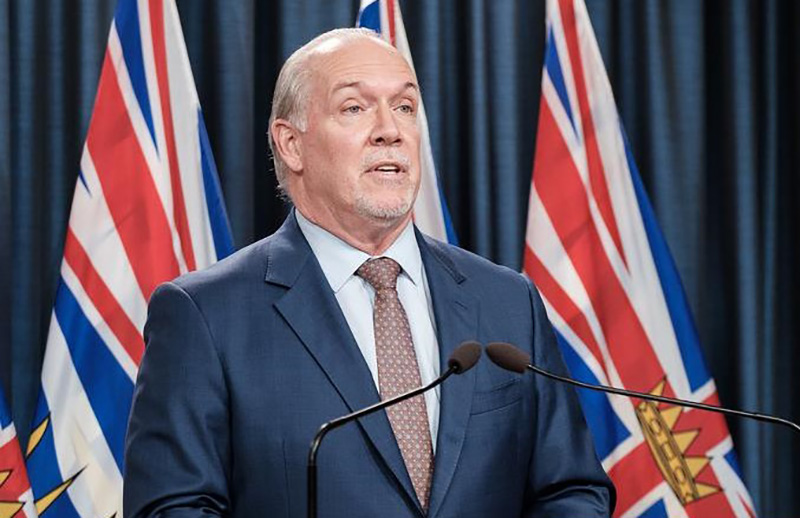The province unveiled a $1.6-billion plan to weather the pandemic through the fall and flu season that will help clear capacity in B.C.’s health-care system without the broad and disruptive measures it took to do so in the spring.
About $850 million has already been announced to fund strategies like the province’s surgical renewal and staffing changes at long-term care facilities.
Wednesday’s plan further vows an aggressive influenza vaccination campaign, introducing a virtual acute care program in Vancouver and a new training and recruitment initiative to fill 7,000 new care aide and other jobs in long-term care to protect the most vulnerable to serious illness due to COVID-19.
Twenty-thousand COVID-19 and flu tests will also be administered daily as the influenza season ramps up.
“This is the plan, to learn and learn again from what we did in March, and to only use the measures we need to,” said Health Minister Adrian Dix on Wednesday.
“We need to accelerate and we need to up our game, not just in the delivery of services, but as citizens across B.C.,” added Premier John Horgan.
March saw all elective surgeries cancelled to clear hospital beds and a scramble to staff long-term care workers at a single site to quell outbreaks among the elderly and medically fragile.
But the province’s modelling for four possible scenarios, based on B.C.’s experience of the pandemic so far, suggest the health-care system has the physical capacity to continue resumed surgeries and handle the historic influx of influenza patients during the respiratory virus peak season in December and January.
More than one in four critical care patients in January 2017, 2018 and 2019 were admitted due to respiratory illness, making repressing flu season key to maintaining hospital capacity. There are currently 533 base-level beds for COVID-19 patients across 19 core sites in B.C.
Evidence from countries in the southern hemisphere suggests that COVID-19 physical distancing measures have also led to milder flu seasons with less transmission, but provincial health officer Dr. Bonnie Henry said that’s not a given to take for granted.
British Columbians need to be steadfast in their distancing and precautions because “the measures we put in place to deal with COVID also protect us from those other respiratory infections,” said Henry, urging everyone over six-months-old to get vaccinated.
The province is spending an estimated $30 million to order 1.9 million doses of the flu vaccine, 450,000 more than normal, and will make them free to the elderly, all residents of assisted living and long-term care facilities, and children who are more susceptible to the illness.
An additional $91.6 million will be spent to implement strategies to connect rural, remote and Indigenous patients to in-person and virtual care.
And $416.6 million will train and hire new aides and top up wages for staff in long-term care across the province, as well as beef up infection control and screening for staff and visitors.
“All of these measures are important to protect our seniors, the most vulnerable people in our population,” said Horgan.
The province is also planning more regional response to surging cases in hospitals, leaving open the potential that some surgeries may be cancelled or rescheduled if a particular site is experiencing an uptick in critical COVID-19 or influenza patients.
Of the $783.9 million earmarked to expand hospital capacity, $42.3 million will fund a new Hospital at Home program to connect elderly and vulnerable residents to acute care in their homes, to limit potential exposure inside a hospital.
At the pandemic’s peak in the spring, there were 104 in hospital and 72 in critical care on April 5, numbers the province says it could handle even double of with full-capacity measures taken.
But neither Henry nor Dix want the province to have to take such measures. They urged British Columbians to keep up their physical distancing, maintain small bubbles and to stay home if they are sick.
“This plan is a plan for the health system, but really it’s a plan for all of us,” said Dix.
There is nothing for sure, even though the last eight months have gleaned deeper insight into the nature of the virus. “We are watching and learning as we go,” said Henry. ![]()
Read more: Health, Coronavirus, BC Politics

















Tyee Commenting Guidelines
Comments that violate guidelines risk being deleted, and violations may result in a temporary or permanent user ban. Maintain the spirit of good conversation to stay in the discussion.
*Please note The Tyee is not a forum for spreading misinformation about COVID-19, denying its existence or minimizing its risk to public health.
Do:
Do not: